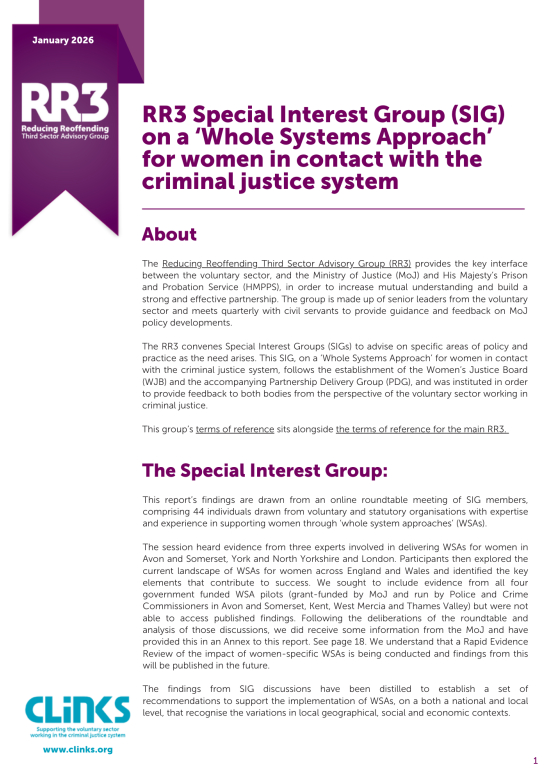It is easy to caricature current concerns about the future role of the private sector in criminal justice as purely ideological. It is far from this. All of us working in this sector can see the need for new thinking and better results from a system that continues to send too many people back to prison.
The need for reform is unquestionable, as is the need to spend resources effectively – thus the call for the voluntary sector to produce robust evidence about its effectiveness. And it is these pragmatic questions of effectiveness and resources that we can and should also ask of the private sector as it readies itself for a bigger role in the delivery of services.
Why? Well, words like banks, transport and energy suppliers would probably come to mind. It is not news to anyone that the private sector has a lot of running to do in terms of building public confidence and all of us, from Parliament to the pub, know that there have been problems. It is also fair to acknowledge that within the private sector there will indeed be companies who are helping transform delivery in positive ways. But even so, it is worth our while heading off some of the potential issues at the pass.
How? We could start by learning even basic lessons from elsewhere. Take energy for example and the hours that have been taken up with the to-ing and fro-ing about the cause of our current predicament - is it the scarcity of energy resources? Or is it the green tax? Or is it the need for these companies to feed the markets? Whatever the cause (or causes) might be and being clear about that is one thing, but the public feeling that they are being well served is another, and it looks like we are some way from the latter.
Surely, it is not desirable for any of us to live in a society where those organisations- whether statutory, private or voluntary- that we all rely upon for a decent basic environment, from the warmth of our homes to the affordability of our transport systems to safety on our streets, are mistrusted by the public who are dependent upon them?
So as we prepare for a transformed rehabilitation service, what would show us that we can have confidence in those that deliver it? Well, first is that lessons from the past are learnt: while a new market and new providers can potentially transform delivery, it is difficult to get this right without proper entry and governance procedures. The entry criteria are now well developed, and that stage of the process underway, so our focus now should be on governance for the future.
Good governance will always depend on the parties involved having a sense that it is not merely policing, but rather a fair mechanism that ensures public confidence and fair play, for both the recipients of the service and the delivery organisation itself. The public view of this is particularly important for two reasons. The first is that it will be the public who are dependent upon the success of these new providers to protect them from re-offending; the second because all of this will be financed by public money. This is a slightly more complicated issue for private companies than generating a profit from the usual market dynamics and, in a context where public safety is involved, potentially even more troublesome than trying to unpick the fairness of the energy markets.
This sense of fair play will come from real transparency about costs. We will need visible proof that profits generated by public funds at least in part find their way back to public benefit over and above shareholder returns; that financial risk is not being shared inappropriately; and that services are regularly reviewed in the interests of progress- without attaching contract variation fees whose only outcome is to embed the stale practices that the contracts originally sought to change. Much of this is already expected from the voluntary sector, so it’s surely not unreasonable to expect it from others.
These are ambitious demands, but stem from pragmatism rather than ideology. It’s worthwhile trying to get it right at the outset through a combination of the power that commissioners have to set the navigation points for the course ahead, and the private sector’s undoubted willingness to demonstrate how it can act to combine both corporate and public interests. Clinks will be taking a hard look at the next stage of the competition process to see if that pragmatism is being replicated.
What's new
Blogs
Violence Against Women and Girls (VAWG) Strategy Blog
Publications
RR3 Special Interest Group (SIG) on a ‘Whole Systems Approach’ for women in contact with the criminal justice system
The RR3 SIG drives a Whole Systems Ap
Latest on X
The role is for a leader from an organisation focused on racially minoritised people, with expertise in service delivery, policy, advocacy, or related areas in criminal justice. Racial disparities are present at every CJS stage. This role ensures these voices are central in shaping policy to help address and eradicate them. Apply by Mon 18 Nov, 10am. More info: https://www.clinks.org/voluntary-community-sector/vacancies/15566 #CriminalJustice #RR3 #RacialEquity

